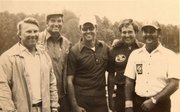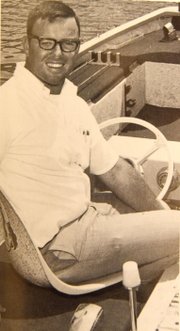Bass fishing has a golden anniversary today, when 106 of the nation's top fishermen converged on Beaver Lake for the All-American Invitational Bass Tournament.
It was the first big-time bass tournament organized by Ray Scott, founder of Bass Anglers Sportsman Society and Bassmaster tournaments, which are major league fishing contests today. The All-American Invitational Bass Tournament began June 6-8, 1967 at Beaver Lake.
Scott had a vision for a top-quality bass tournament, unlike contests back then where prize money was minimal and cheating was common. Scott, an insurance salesman from Alabama, chose Beaver Lake for its beauty and good fishing. The lake, built in 1965, was new and the fishing was hot.
Scott talks about that first tournament in a chapter of his book, Bass Boss, published in 1999. He approached the Springdale Chamber of Commerce and its late president, Lee Zachary, with the idea for his fishing tournament.
The chamber jumped on it. A tournament with the nation's best fishermen would bring business to town. It'd fill motel rooms and promote Springdale and Beaver Lake. The chamber gave Scott a small office to use while he organized the event and loaned him expense money.
Back then the owner of the Springdale Holiday Inn was a chamber member. He offered Scott a free room and his meals at half price if Scott would headquarter the tournament at the motel, which Scott did.
Rules were strict to prevent cheating. Anyone who lived in a county that touched Beaver Lake was not allowed in the tournament. In fact, most contestants were from out of state. No buddies could fish together. No fishermen from the same state were paired. Partners changed every day. Fishermen could not leave the boat for any reason. Those rules are intact today at bass tournaments around the country.
Entry fee was $100. First prize in the All-American Invitational Bass Tournament was $2,000. Scott decided to pay prize money through 10th place, with tenth receiving $100.
Scott used some of the money the chamber loaned him to get a WATS line in his office. He worked the phone hard to line up 100 of the nation's top anglers and had 106 by tournament time.
One of Scott's recruits was a young angler named Billy Dance from Tennessee. Dance would finish second at the tournament but go on to become one of the most recognizable faces in fishing.
Stan Sloan of Nashville, Tenn., won the All-American with 37 pounds, 8 ounces. He won $2,000, but also a fishing vacation in Mexico that Scott added to the prize pot. Sloan also won a lot on Beaver Lake valued at $3,500 for catching the largest bass.
The 106 competitors started from five different marinas on Beaver Lake at 6 a.m. sharp on June 6, 1967. Don Butler, one of the anglers, remembers in Scott's book how the takeoff went.
"There were all kinds of boats in the tournament," Butler said. " I had a Kinzie Craft with a 33 horsepower motor and a trolling motor. I though that was pretty fancy equipment."
Most were aluminum flat bottom boats. One angler had attached a tractor seat to the top of his outboard, sort of a prototype of the pedestal fishing seats on bass boats today.
Dance caught the first fish of the tournament, a 2-pound bass that bit a plastic worm.
A half dozen wildlife officers from the Arkansas Game and Fish Commission weighed the fish each day, Scott writes. Weigh-ins were in a field along U.S. 71 (now 71B) at a Tyson turkey farm. Springdale chamber members cleaned all the fish and gave them to a local "orphanage" called Boys Land.
Ten of the 106 anglers went home with prize money. Scott didn't make a penny. He lost $600 on the venture, but recouped it big time as his new Bass Anglers Sportsman Society and its professional tournament circuits grew.
And it all started 50 years ago, here on our own Beaver Lake.
Flip Putthoff can be reached at [email protected] or on Twitter @NWAFlip
Sports on 06/06/2017



